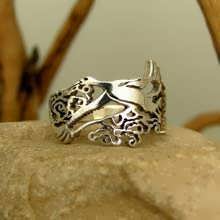
Japanese Stork Ring Silver
Inspired by the events of returning the Japanese Stork at Toyooka, Japan
A symbol of hope the humankind will find ways to restore harmony and balance to our planet earth
Mother Earth is very dear to my heart,
My workshop is located close to the area where I grew up. I have childhood memories of wild expanses of golden sands and pine trees, of walking among wildflowers looking for turtles, toads and lizards. I once kept a turtle I found as a pet. Today in those same fields are apartment buildings and a monstrous shopping mall and instead of the wild field with the pine trees, bushes, wildflowers and animals, is a parking lot sprouting… cars.
All this change has happened in only twenty years.
The Japanese Stork Ring
The following moving story inspired me to create the ring that definitely brings hope and show how paying attention to the environment is the only way we can live on planet Earth.The story begins in 2004 in the town of Toyooka, Japan. A powerful Typhoon caused flooding of the Maruyama River. At the same time¸ 10-year-old Yuka Okada sat in a shelter with friends from her class and came to the understanding that people are responsible for a large part of the damage to the environment, and not just natural forces.
The way that Yuka decided to make an impact was by bringing back the eastern Japanese stork to the city skies. The stork was common in the past in Japan; however during the 50s and 60s due to extensive use of chemical pesticides in the rice paddies where they fed, they quickly disappeared from the landscape until the very last one disappeared in 1971. Students turned to the Mayor and requested that he allow them land where they could grow chemical and poison-free rice crops in order to bring back the eastern Japanese stork to the city skies. A few years earlier a small breeding center was established to conserve the stork. Due to the fact that the mayor, the student’s and residents of the town backed the project, large expanses of fields were transitioned back to organic gardening methods.
The students proved that clean organic agriculture does not reduce the yields and other growers were subsequently convinced to convert their fields into pesticide-free zones. This change brought back to those same fields biodiversity and the resurgence of insects and worms. As a result, in 2005, the local authorities began the process of releasing the storks back into the wild, which then started to nest in the environs of the town.
As a result, the town became a buzzing tourist attraction and the farmer’s organic produce is marketed successfully.
The pendant is a symbol of hope the humankind will find ways to restore harmony and balance to our planet earth.